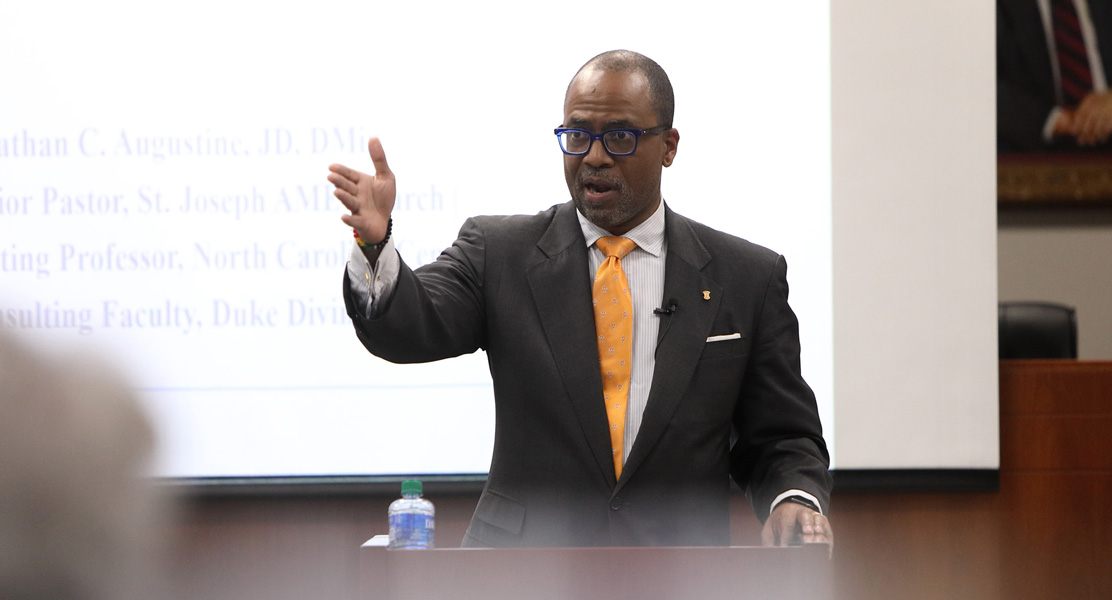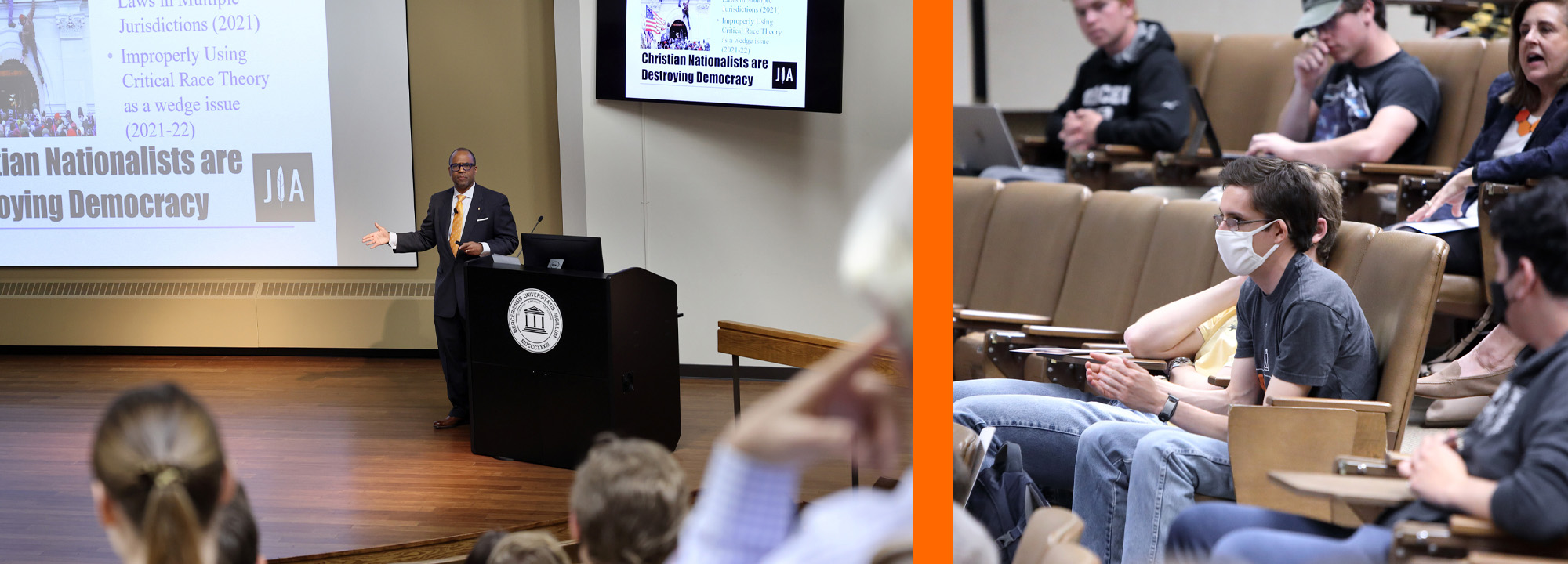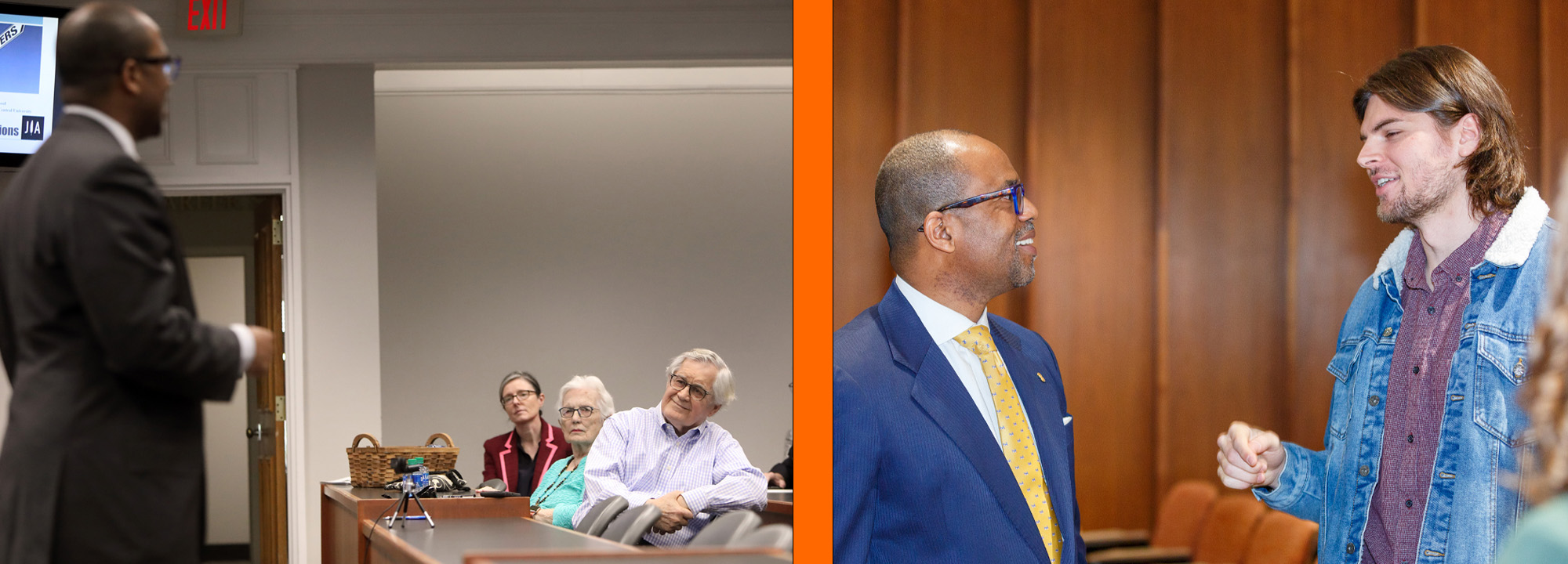Breaking down the boundaries created by Christian nationalism
Rev. Dr. Jay Augustine outlines threats to democracy and how to be heard

“Democracy is nothing more than an ideal for which we must fight,” said the Rev. Dr. Jonathan C. “Jay” Augustine, as he showed how the treasured concept is under attack by Christian nationalists attempting to circumvent voting rights and re-write American history.
In March, Dr. Augustine brought his legal expertise, ministry experience and theological knowledge to the campuses of Mercer University in Atlanta and Macon, Georgia, giving three presentations for the 2022 Walter B. and Kay W. Shurden Lectures on Religious Liberty and Separation of Church and State.
A pastor, professor, author and advocate, Dr. Augustine is a multidisciplinary professional who serves in both ordained ministry and academia. He is part of a group of national social justice leaders who speak for the equality of all human beings, while advocating for policies of diversity, inclusion and belonging. In addition to serving as the senior pastor of St. Joseph AME Church in Durham, North Carolina, and as a missional strategist with the Duke Center for Reconciliation, he is also a law professor at North Carolina Central University. He has been published in law reviews throughout the country, and his latest book is Called to Reconciliation: How the Church Can Model Justice, Diversity, and Inclusion (Baker Academic, 2022).
“And Who is My Neighbor?” was the question posed by Dr. Augustine when he spoke at Mercer University’s McAfee School of Theology in Atlanta during chapel service on March 29. He discussed two texts: The sacred text of the parable of the Good Samaritan (Luke 10:25-37) and the secular text of a book on Christian nationalism called Taking America Back For God: Christian Nationalism in the United States by Dr. Samuel Perry and Dr. Andrew Whitehead.
He asked the audience that important question of who is their neighbor, pointing out that Jesus redefined the concept of neighborhood in the Good Samaritan parable, with “neighbor” having more to do with shared values and finding commonality. And, he pointed out how we’ve often gotten it wrong.
As Dr. Augustine shared, Dr. Whitehead and Dr. Perry’s work shows how the ideology of Christian nationalism is used to draw boundaries between groups.
“Jesus teaches us how to not draw boundaries of ‘us’ versus ‘them,’ and how to embrace the proverbial ‘other,’” Dr. Augustine said.
“Jesus shows us that a real neighbor is someone who will not marginalize you, because a neighbor will be deliberate in trying to identify with you.”
Dr. Augustine said your neighbor could be next door or in another city, your neighbor might be Black, white, male, female, cisgender or transgender, but none of those identifiers are the key to identifying a neighbor.
“Whenever you find commonality with someone and are deliberate in connecting with the ‘other,’ that person is your neighbor,” he said.
“This good Samaritan must have rejected differences to find a culture of commonality. He must have rejected those boundaries of Christian nationalism as defined by ‘us’ versus ‘them’ that grow out of a civil religion — that has little to do with faith but has everything to do with power.”
Dr. Augustine believes this good Samaritan must have believed in racial reconciliation because he rejected the impulse of unconscious bias and was more concerned about things that unite people.
Dr. Augustine said he’s asking everyone one question: Will you be my neighbor? Doing so means to stop drawing boundaries, to reject the conflation of authorities, and to speak out for policies that allow everyone’s voice to be heard.
Of course, being a good neighbor and speaking up for others doesn’t mean people must give up our individual characteristics that make us who we are, Dr. Augustine noted. He suggested we move away from the idea of a “melting pot” — which speaks to assimilation and giving up part of yourself to fit in. Instead, he advocated for embracing a “gumbo” idea, where individual parts come together without losing their individuality.
In gumbo, “shrimp can be shrimp, sausage can be sausage,” he said. “You don’t have to be something you aren’t in gumbo — you can be your full and authentic self.”
The next day, Dr. Augustine moved to the Macon campus of Mercer University for two additional lectures. He first spoke to undergraduate students, faculty and guests at the Mercer Medical School Auditorium, sharing more detail about the political history and problematic reality of religious liberty and Christian nationalism.
Dr. Augustine explored how many of the divisions we have in the United States are correlated to or emanate from religion and the free exercise of it, sharing how the church has played a vital role throughout our country’s history, often going hand-in-hand with both American progress and American regress.

Dr. Augustine provided a detailed history of the United States, pointing out seeds that were sown from Puritan theology to Manifest Destiny that led to the emergence of Christian nationalism. And, he showed how the “us” versus “them” dichotomy created by that ideology is destroying the concept of democracy by limiting the viewpoints of others.
In Colonial America, he said our country wanted people to have absolute religious liberty, but that cuts both ways: Religious liberty told some people to subjugate other people through slavery, and it told some to rise up from subjugation.
“Prophetic leadership rose up in the church during the period of enslavement,” he said.
“Prior to emancipation, the Black Church was the place where liberation theologies were born as well as theologies of passive resistance and rebellion against the status quo.”
Tracing history through the centuries, Dr. Augustine said a turning point — particularly for Christian nationalism — was in the mid-1950s. That’s a time period when “under God” was added to the Pledge of Allegiance, and it’s when the modern Civil Rights Movement began.
Dr. Augustine says, no matter how you look at it, the Civil Rights Movement came from the church, whether you trace it as kicking off with the Brown v. Board of Education decision in 1954 that ended the “separate but equal” rule or the 1955 Montgomery Bus Boycott.
“Why am I saying the church? Brown who brought suit — her father was a minister at St. Mark’s AME church in Topeka, Kansas,” he said, pointing out that this “rising up” in a legal context was part of liberation theology. Meanwhile, the civil disobedience of Rosa Parks and the Rev. Dr. Martin Luther King Jr. in the Montgomery Bus Boycott also had a theological underpinning.
“Here was an undergirding of civil disobedience – a civil disobedience that is not so much traced to Henry David Thoreau, but a civil disobedience that is traced to Shadrach, Meshach and Abednego,” he said in a reference to the biblical story found in Daniel 3 of the three men refusing to bow to an earthly king.
Part of religious freedom, Dr. Augustine said, is rising up to give freedom to those who have been marginalized.
“What does it look like when God motivates you to put your physical self at issue for something that’s greater than yourself to imitate the sufferings of Christ?”
He said it looks like lunch counter sit-ins or the Freedom Rides in the 1960s because Christ died for everyone, and people are equal to each other.
“Religious liberty undergirded this willingness to sacrifice in the course of the Civil Rights Movement for the concept of freedom and justice,” he said.
In the wake of this, Dr. Augustine said we started to see Christian nationalism rise up to defend the “power structure,” often using wedge issues — from abortion to Critical Race Theory — to maintain power and the status quo and create that “us” versus “them” dichotomy.
Dr. Augustine sees hope, though, that we are getting back to that prophetic work of breaking down walls and dismantling false barriers. One reason for his optimism comes from the diverse groups he saw during the Black Lives Matter protests in the summer of 2020, noting that those gathered were multi-cultural and multi-generational.
“They were people coming together embracing, if you will, the prophetic side of what we’ve seen in religious liberty that says if we hold these truths to be self-evident — says the great declaration — that all people are created equal, then all must mean all.”

In his third lecture, Dr. Augustine addressed a room of law students and legal scholars at the Mercer University School of Law as he discussed Christian nationalism and recent attempts to undermine democracy, including the 2013 Supreme Court decision of Shelby County v. Holder that gutted the Voting Rights Act of 1965.
Dr. Augustine stated that the Voting Rights Act was the most measurable indication of success in the Civil Rights Movement — it was legislation that allowed everyone to participate in the democratic process. But, that 2013 decision is devastating.
As he illustrated in his previous lecture, Dr. Augustine noted that religious freedom is at the heart of democracy, motivating civic participation.
“The Voting Rights Act is still on the books, but it might as well not be on the books,” he said. He compared it to a dog who can still bark but can no longer bite because the 2013 decision declared as unconstitutional the section that determined which states were subject to federal oversight based on their histories of discrimination in voting. In the years since the decision, he noted that we are seeing states outdo each other in their zeal to limit voting. He gave an example of a voter ID law in which the acceptable IDs are those that are more difficult for some people to obtain and listed the IDs those groups tend to have as unacceptable.
He said it’s just one in a list of examples of a Christian nationalism ideology that is creating a group of insiders and outsiders — that “us” versus “them” idea.
“In a post-2020 election America, voter suppression now is legion. Almost every state is wrestling with laws that make it harder and more onerous for people to vote because the powers that be — those attempting to preserve power — don’t ever want as many people who voted in 2020 to vote en masse again.”
“If Christian nationalism is about anything, it’s about power and preserving the status quo,” Dr. Augustine said. He pointed out that we saw examples at the attack on the U.S. Capitol on January 6, which included rioters carrying flags that said “Jesus is my savior, Trump is my president.”
“How did we get to that point — where those two are so closely wedded?” he asked, noting that Christian nationalism conflates cross and country to achieve its purposes.
“It’s not about acceptance or inclusion, but it’s about … tribalism. If you’re not in it, you’re against it, and you must be taken down, and anything against the status quo must be going against God,” he continued.
“So, to preserve power, Christian nationalism is destroying democracy,” Dr. Augustine said, referring back to the insurrection, voter suppression laws, and efforts to ban books and un-write history.
“Christian nationalism, I believe, requires a prophetic response from the church. I believe it also requires a legal response from those who have legal training and care about the law.”
And then he challenged the audience to take action and care for others.
“What about you? What about you testifying in committee when laws are going through your general assembly or your state legislature?” he asked, encouraging citizens to make their objections known on the record.
He also asked listeners to consider partnering with faith leaders to challenge voter suppression laws. “Even if you lose in the court of law, you can win in the court of public opinion.”
Knowing how religious freedom has motivated others to take action, Dr. Augustine said it’s time to ask yourself how you can be involved and what you are willing to do.
The Walter B. and Kay W. Shurden Lectures on Religious Liberty and Separation of Church and State were established when the Shurdens made a gift to BJC in 2004 for this annual lectureship. Learn more online at BJConline.org/ShurdenLectures.
This article first appeared in the summer 2022 edition of Report from the Capital. You can download it as a PDF or read a digital flip-through edition.




